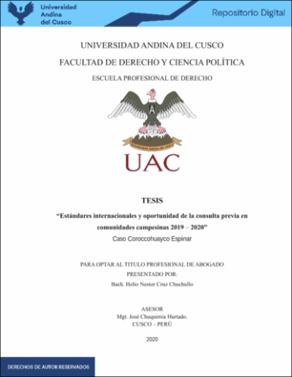| dc.contributor.advisor | Chuquimia Hurtado, José | |
| dc.contributor.author | Cruz Chuchullo, Helio Nestor | |
| dc.date.accessioned | 2021-08-04T00:14:58Z | |
| dc.date.available | 2021-08-04T00:14:58Z | |
| dc.date.issued | 2021-01-05 | |
| dc.identifier.uri | https://hdl.handle.net/20.500.12557/3977 | |
| dc.description.abstract | La consulta previa es aplicable en el Perú desde el año 1995, sin embargo, entra en
vigencia el año 2012 a través de la Ley de consulta y su la reglamentación un año
después, con la cual recién es aplicable a los pueblos originarios, principalmente en
las comunidades nativas en la zona selva de nuestro país, seguido de continuos eventos
de conflictividad socio ambiental en comunidades campesinas.
Ante la conflictividad socio ambiental la respuesta del Estado ha sido reprimir con la
fuerza militar policial hasta denominar a las personas originarias o indígenas como
ciudadanos de segunda clase, todo esto ha agudizado las graves diferencias que
coexisten entre comunidades originarias, la Empresa y el propio Estado.
La investigación está centrada en identificar los estándares internacionales, así como
establecer la oportunidad para la aplicación del proceso de consulta.
En el primer capítulo abordamos la metodología, objetivos, hipótesis y el problema
para el desarrollo de la investigación, seguido del capítulo segundo en el que nos
centramos en el marco teórica, en el que se encuentran instrumentos normativos e
ilustrativo, organismos internacionales, comunidades campesinas y derechos
colectivos, pueblos originarios, estándares internacionales y las fases de consulta. En
el capítulo tercero y cuarto no dedicamos contextualizar a partir de la conflictividad
socio ambiental, análisis del caso Coroccohuayco en la provincia de Espinar y los
resultados de la investigación.
Identificar la oportunidad de consulta previa es la fase sustancial, de ella surgirá la
necesidad de analizar sobre la reparación y afectación social y ambiental en las
comunidades campesinas. La ley debe proteger a los pueblos y ello nos llevará
inevitablemente a consultar el instrumento ambiental antes de su aprobación, así como
de la aplicación de estándares internacionales en la consulta. | es_PE |
| dc.description.abstract | Prior consultation is applicable in Peru since 1995, however, it comes into force in
2012 through the Consultation Law and its regulation a year later, with which it is only
applicable to indigenous peoples, mainly in the native communities in the jungle area
of our country, followed by continuous events of socio-environmental conflict in
peasant communities.
Faced with the socio-environmental conflict, the State's response has been to repress
with the military police force to denominate native or indigenous people as secondclass
citizens, all this has exacerbated the serious differences that coexist between
native communities, the Company and the State itself.
The research is focused on identifying international standards, as well as establishing
the opportunity for the application of the consultation process.
In the first chapter we address the methodology, objectives, hypotheses and the
problem for the development of the research, followed by the second chapter in which
we focus on the theoretical framework, in which there are normative and illustrative
instruments, international organizations, peasant communities and collective rights,
indigenous peoples, international standards and the consultation phases. In the third
and fourth chapters we do not dedicate contextualizing, based on the socioenvironmental
conflict, the analysis of the Coroccohuayco case in the province of
Espinar and the results of the investigation.
Identifying the opportunity for prior consultation is the substantial phase, from which
will arise the need to analyze the repair and social and environmental impact on
peasant communities. The law must protect the peoples and this will inevitably lead us
to consult the environmental instrument before its approval, as well as the application
of international standards in the consultation. | en_US |
| dc.format | application/pdf | es_PE |
| dc.language.iso | spa | es_PE |
| dc.publisher | Universidad Andina del Cusco | es_PE |
| dc.rights | info:eu-repo/semantics/openAccess | es_PE |
| dc.rights.uri | https://creativecommons.org/licenses/by-nc-nd/4.0/ | es_PE |
| dc.subject | Consulta previa | es_PE |
| dc.subject | Reglamentación | es_PE |
| dc.subject | Personas originarias | es_PE |
| dc.subject | Indígenas | es_PE |
| dc.title | Estándares internacionales y oportunidad de la consulta previa en Comunidades Campesinas 2019-2020 - Caso Coroccohuayco Espinar | es_PE |
| dc.type | info:eu-repo/semantics/bachelorThesis | es_PE |
| thesis.degree.name | Abogado | es_PE |
| thesis.degree.grantor | Universidad Andina del Cusco. Facultad de Derecho y Ciencia Política | es_PE |
| thesis.degree.discipline | Derecho | es_PE |
| dc.publisher.country | PE | es_PE |
| dc.subject.ocde | https://purl.org/pe-repo/ocde/ford#5.04.05 | es_PE |
| renati.advisor.dni | 23964614 | |
| renati.advisor.orcid | https://orcid.org/0000-0003-3803-4161 | es_PE |
| renati.author.dni | 41978481 | |
| renati.discipline | 421016 | es_PE |
| renati.juror | Salas Callo, Antonio | |
| renati.juror | Mujica Paredes, Boris Germain | |
| renati.juror | Barreto Jara, Sixto Madison | |
| renati.juror | Delgado Montaño, Mario Miguel | |
| renati.level | https://purl.org/pe-repo/renati/level#tituloProfesional | es_PE |
| renati.type | https://purl.org/pe-repo/renati/type#tesis | es_PE |


